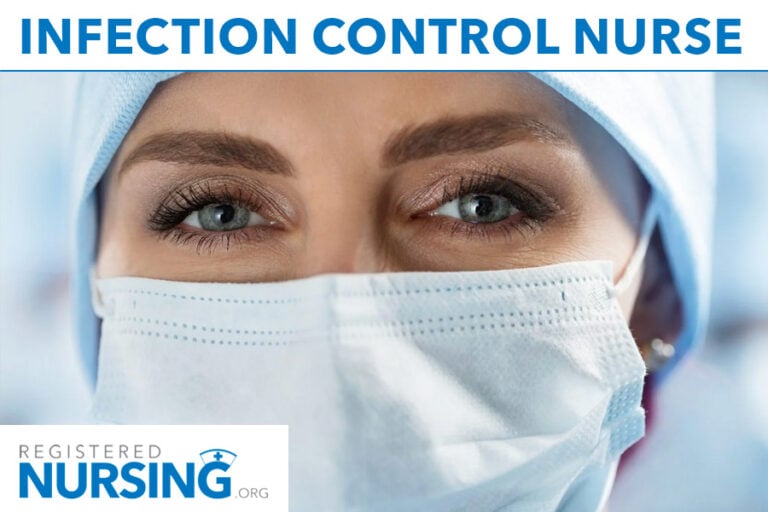Infection Control/Prevention Nurse

What is an Infection Control/Prevention Nurse?
As all nurses are trained to prevent the spread of infectious diseases, infection control/prevention nurses specifically specialize in preventing the spread of infectious agents such as that of viruses and bacteria. With no two bacteria alike, infection control/prevention nurses work diligently to prevent dangerous outbreaks from occurring in a hospital setting. All medical professionals are trained to take standard precautions that include hand hygiene, use of personal protective equipment, and isolation precautions according to the patient being cared for. Even so, such precautions do not completely eliminate the possibility for infectious agents to spread. It is an infection control/prevention nurse's job to perform and educate others on how to prevent and contain outbreaks and to prevent further incidents from occurring.
If you’re interested in the role of an infection control/prevention nurse, you may also be interested in these related nursing positions:
| Role | Primary Responsibilities | Required Qualifications | Work Environment |
| Epidemiologist | Study patterns and causes of diseases, collect and analyze data, design and conduct studies, develop public health policies, educate communities on disease prevention | Master's or Doctoral degree in Public Health (MPH/PhD), experience in epidemiology | Public health agencies, research institutions, hospitals, government agencies |
| Infectious Disease Nurse | Care for patients with infectious diseases, administer treatments, educate patients on disease management, collaborate with healthcare teams on patient care plans | RN license, BSN or Associate's in Nursing (ADN), experience in infectious disease care, Certification in Infection Control (CIC) beneficial | Hospitals, outpatient clinics, specialized infectious disease units |
| Public Health Nurse | Educate communities about health issues, conduct health screenings, develop and implement public health programs, provide direct care in community settings | RN license, BSN required, MPH (Master's in Public Health) beneficial | Community health centers, schools, public health departments, nonprofit organizations |
| Infection Control Coordinator | Coordinate infection control programs, oversee compliance with infection control standards, conduct risk assessments, manage data collection and reporting, train staff | RN license, Certification in Infection Control (CIC), experience in healthcare administration or management | Hospitals, long-term care facilities, healthcare systems |
| Occupational Health Nurse | Promote workplace health and safety, assess and treat work-related injuries and illnesses, develop health education programs for employees, ensure compliance with health regulations | RN license, BSN preferred, Certification in Occupational Health Nursing (COHN) | Corporate settings, manufacturing facilities, public agencies, healthcare institutions |
How Do I Become an Infection Control/Prevention Nurse?
Upon graduating with a Bachelor’s of Science in Nursing degree from an accredited school and passing the National Council Licensure Examination for Registered Nurses (NCLEX-RN), one can get licensed as an RN and secure a position in infection control after obtaining some experience in the nursing field.
What Are the Schooling Requirements for Infection Control/Prevention Nurses?
The education requirement to become an infection control/prevention nurse is to earn a Bachelor’s of Science in Nursing (BSN) degree. Although a nursing diploma or an Associate's Degree in Nursing has been the minimum requirement, many employers prefer graduate nurses to obtain a bachelor's degree in nursing. A BSN degree typically takes four years to complete in a university or college.
Are Any Certifications or Credentials Needed?
With the proper nursing degree and a couple of years of experience, a nurse will be eligible to sit for the certification exam with the Association for Professionals in Infection Control and Epidemiology (APIC).
What Does an Infection Control/Prevention Nurse Do?
The role of an infection control/prevention nurse is to determine, prevent, and contain infectious outbreaks in the healthcare setting. Even in a sterile and sanitary environment, an infection can easily spread causing patients to become ill and possibly die. In order to prevent the spread of this infection to a large area, it is the job of an infection control/prevention nurse to not only contain these agents within a hospital community but also to prevent such illnesses on a larger scale.
Where Do Infection Control/Prevention Nurses Work?
The expertise of an infection control/prevention nurse is needed in the following healthcare settings:
- Hospitals
- Long-term care facilities
- Home Care
- Ambulatory Care
- Hospices
- Government agencies
- Public Health
- Behavioral Health
What Are the Roles and Duties of an Infection Control/Prevention Nurse?
With advanced skills and knowledge, the responsibilities of an infection control/prevention nurse include:
- Gathering and analyzing infection data, facts, and trends alongside other healthcare personnel.
- Providing training and education to other medical professionals and civilians on prevention techniques.
- Developing plans to prevent patients from spreading diseases throughout the hospital or other patient care facilities.
- Often acting as a coordinator or leader of an Infection Prevention and Control (IPC) Program.
- Reinforcing the implementation of infection control practices as provided in the guidelines of the CDC (Centers for Disease Control and Prevention).
- Bringing rates of infection down within a facility.
- Determining the origin of a particular pathogen by studying the makeup and composition of it.
- Working alongside scientists and doctors to develop treatments for other infectious diseases.
Infection Control/Prevention Nurse Salary & Employment
Infection control/prevention nurses can earn between $85,000 and $152,5003 annually. The median salary for an RN in Infection Control is $124,500 per year. As the salary can vary widely depending on many factors, it is important to keep in mind the type of employer, years of experience, and state when comparing salaries.
Potential nurses should be experienced in proper chemical disinfection and sterilization practices. As a big part of one's role as an infection control/prevention nurse is to instruct and educate patients and hospital staff, one should be comfortable with public speaking and giving direction. An effective infection control/prevention nurse is a big asset to a healthcare facility, and these nurses can find employment throughout hospitals and healthcare centers.
| Average Annual Salary | |
| Lowest Earners | $152,500 |
| Median | $124,500 |
| Top 25% of Earners | $109,065 |
| Top Earners | $85,000 |
Helpful Organizations, Societies & Agencies
- American Journal of Infection Control
- Infection Control Today
- Certification Board of Infection Control and Epidemiology
- Infection Prevention and Control
- Infection Control Salaries








